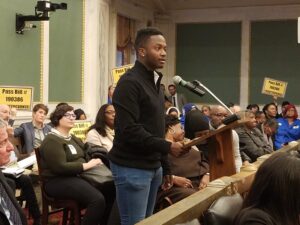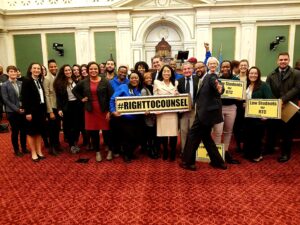The Center’s Access to Justice Clinic focuses on the civil justice gap – the fact that so many people who need help with important legal problems can’t get it. This spring, students examined a variety of innovative efforts to deliver help to unrepresented people, and also worked on two Philadelphia-based projects. (More on those projects, one of which looked at default judgments in eviction court, the other at public libraries as sources of legal information, in subsequent posts.)
But this also turned out to be the semester of COVID-19, which unexpectedly reinforced some of the clinic’s lessons. As state and federal courts issued order after order announcing special arrangements for urgent matters and postponing everything else, the limitations of our justice system stood out in bold relief. It is, after all, a system that’s heavy on personal appearances, crowded spaces, traditional but inefficient scheduling practices, and — still — a great deal of paper. And since it was simply impossible to continue normal operations under current circumstances, courts and administrative agencies ground to a quick and massive slowdown.
That would be a problem at any time, but it’s more so now, since the virus is producing a considerable increase in the numbers of people needing help with legal matters — unemployment, health care, housing, domestic violence, and more. The combination of backlogged courts and agencies, and an already underresourced legal aid system that could easily become further overwhelmed, creates a frightening prospect.
Yet there may also be seeds of hope here. For example, remote systems put in place during the pandemic may demonstrate their value and prove to be worth keeping in more normal times. While remote services must be carefully designed and are not appropriate for all situations, they can, as the National Center for State Courts argues, make court operations significantly more efficient and consumer-friendly — and, in some circumstances, navigable by litigants who lack access to full representation. Similarly, newly-improvised systems for handling urgent matters – such as new access points and modified procedures for people seeking protection from abuse orders – may turn out to be worth further development even after the pandemic has passed.
In this way, as students in the clinic were quick to note, the virus may be forcing reinvention in a field usually known for its strong adherence to tradition. And amid all the losses and sadness, that, at least, could turn out to be a good thing.
For more information on the Sheller Center’s Access to Justice Clinic, click here.

 Xavier and colleagues Julia Sheppard and Sarah Kim have spent the semester researching why so many landlord/tenant cases in Philadelphia result in default judgments — which then lead quickly to eviction.
Xavier and colleagues Julia Sheppard and Sarah Kim have spent the semester researching why so many landlord/tenant cases in Philadelphia result in default judgments — which then lead quickly to eviction.